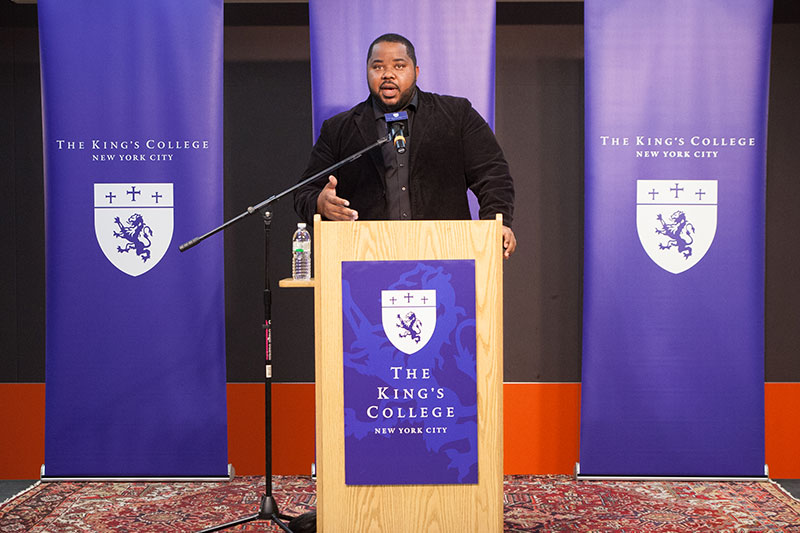Harlan Redmond Challenges King’s to Compassionate Dialogue On Race
“If we are to be one, clothed in Christ Jesus, we need to do the work of becoming one. Inconvenience yourself to become one," Redmond said.

On February 20, in honor of Black History Month, The King’s College hosted Pastor Harlan Redmond for a talk entitled “The Rise of a Servant,” his own story of acting on God’s call to serve the city of Pasadena, Calif.
Pastor Redmond serves as Executive Director and Principal of Harambee Ministries, a nonprofit dedicated to providing Biblical hope to Northwest Pasadena. Redmond served in the United States Army and is a veteran of the Iraq War, and holds a Bachelors of Science degree in Organizational Leadership (Azusa Pacific University) and a Masters in Teaching (University of Southern California).
When Dr. John Perkins founded the Harambee Christian Family Center in 1982, he focused on the neighborhood with the greatest need–Pasadena’s most dangerous street corner. In Swahili, “harambee” means “Let’s get together and push.” Harambee now hosts an elementary school, community garden, transitional housing, and a catering business that employs teens and adults.
Redmond told the audience in the City Room how he became heir to Perkins’s legacy when someone he had mentored asked him to join the board of Harambee in 2011. Redmond flew in to visit and heard Dr. Perkins tell of losing his mother when he was seven months old. She died from a calcium deficiency disease, probably giving her young son the nutrients that she needed.
For Redmond, hearing this story was like hearing a challenge from Perkins’s mother: “What are you doing to alleviate the burdens of people like me?” Redmond recognized that his life had been more representative of the culture than his own faith as a Christian. He started realizing that God had created him to be a conduit of His love, compassion, and justice.
Finding his identity in Christ transformed Redmond and motivated him to care about serving his struggling neighbors. Likewise, Redmond challenged students, staff, and faculty to serve one another by engaging in the hard work of racial reconciliation. Redmond defined privilege as “the fact that you are able to live your life not needing to know what it’s like to be someone else.” To live as a Christian, Redmond said, requires us to be reflective of our own privilege and how it divides us from our brothers and sisters.
“If we are to be one, clothed in Christ Jesus, we need to do the work of becoming one. Inconvenience yourself to become one,” he said.
In the Q&A that followed, students pursued practical questions about how to work towards the unity Redmond championed. How do students of color dialogue with peers who believe that racial prejudice doesn’t exist in this country? How could they foster a compassionate conversation, in place of a maliciously curious one? How does someone become personally aware of how they need to change? Redmond encouraged students to persevere even in the face of discomfort and to listen to Christians who see things differently.
Redmond’s address is part of an ongoing conversation on race and diversity at The King’s College. Two of the students who raised questions are members of The Table, a group formed by African American and Hispanic staff and students at King’s. The Black History Month speaker series began with Gregory A. Thornbury’s presidency and has previously featured James Roberson, lead pastor at The Bridge Church.
In July 2015, President Thornbury formed a Commission on Multi-Ethnicity, charging a group of faculty, staff, alumni, and students to consider how The King’s College can better support and retain ethnic minority students.
David Leedy, Dean of Students and Chair of the President’s Commission, said of Redmond’s visit: “From Frederick Douglass to Maya Angelou, African Americans have left a profound mark on American society. Yet that heritage is often minimized or overlooked. It is fitting that The King’s College takes this month to celebrate the rich legacy of African American leaders, thinkers, and artists in our nation. This is especially relevant at a time when ethnic diversity is steadily on the rise in the King’s student body. I am thankful to have Harlan Redmond help us think well about what it means to celebrate the cultural riches in our country, yet cultivate an authentic and enduring unity in Jesus Christ.”




